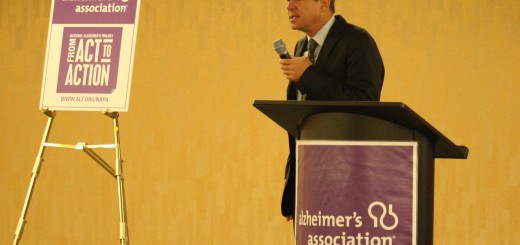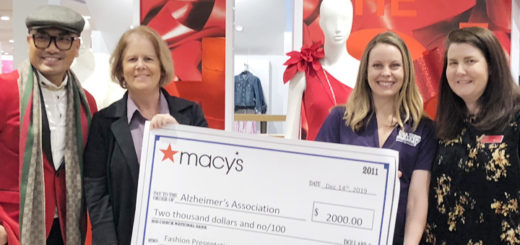UC Berkeley graduate forms club to honor grandfather
Vy Pham’s grandfather, Ve Nguyen, died in 2016 from Alzheimer’s disease. To feel less helpless in the wake of his death, Vy volunteered as an Alzheimer’s Association® advocate. Five years later, she has created the Bear Brain Initiative, an organization at UC Berkeley that encourages students to learn more about the disease, engage with those living with Alzheimer’s and recruit more advocates to make change.
Ve’s early life
Ve Nguyen, Vy’s grandfather, was a Lieutenant Colonel in the Southern Vietnamese Army. He had many professions in his life including jail warden and Governor of Côn SÆ¡n Island.
At the height of the Vietnam War, Ve, his wife, and his five children immigrated to the United States, living in a series of refugee camps. Eventually, Ve and his wife would go on to have nine grandchildren.
Barriers in a diagnosis
In the mid 2000s Vy’s family began noticing that Ve was having some problems with his memory. “At first he couldn’t remember the directions to my house,” said Vy. “Eventually he couldn’t drive anymore.”
Ve struggled with English medical terminology. Because of the language barrier, he always had to have one of his children take him to the doctor. “All of my aunts and uncles are hardworking individuals who work full time,” said Vy. “It was hard for them to find time to take him to appointments and drive him places. He always had to have someone present to listen to the doctors and figure things out.”
Stigma and discrimination as barriers to diagnosis
Ve was diagnosed in 2009 with Alzheimer’s disease. While Vy’s family didn’t have a problem getting a diagnosis for Ve, not all Asian families do.
Vy believes it’s due to a lack of information and resources available in the community. “Especially for Alzheimer’s disease,” said Vy. “It’s seen as a natural progression of age, even though that isn’t true.
In some Asian cultures there is also a stigma surrounding dementia. They view it as something shameful. “That stigma is holding them back from reaching out and getting help,” said Vy.
“It would be wonderful to share resources that say, “˜hey this isn’t normal.’ We need to distribute information to the community-based clinics. Getting a diagnosis for my family was so powerful.”
According to the Alzheimer’s Association 2021 Alzheimer’s Disease Facts and Figures report nearly one-fifth of Asian Americans believe that discrimination would be a barrier to receiving Alzheimer’s care. One-third of Asian Americans believe their own race or ethnicity makes it harder to get care and have experienced health care discrimination.
Finding the Alzheimer’s Association
When Vy was a kid, she knew her grandfather was always there to take care of her. As the disease progressed, she slowly replaced her image of her grandfather with someone who repeated themselves often.
“I recently found a VHS tape of him swimming with me and holding me,” shared Vy. “It was a side of him I hadn’t seen in so long One of my last memories of him of him is him asking me “˜what did you do’ five times in a row.”
When Ve passed in 2016, just before Vy started college, she felt helpless. “In my freshman year of college, I was looking for organizations to join to feel like I was actively contributing to the conversation,” said Vy. “Then I found the Alzheimer’s Association. Knowing how strong my grandfather was and then seeing who he became as a result of Alzheimer’s was a big motivator as why I decided to become an advocacy volunteer.“
Recruiting other advocates
In the beginning, Vy wasn’t as active with the Alzheimer’s Association as she would like to have been. She couldn’t get her schedule to line up with the available events. In 2019 she was able to make her first legislative visit.
“I’d never seen advocacy in action. It was so cool,” said Vy. “Sitting across from Portia, who was leading the meeting, as she went over the facts and figures, I thought, “˜this is incredible.’ It was a great moment, that I could share my story with the staff.”
In 2020, due to the pandemic, everything moved to a virtual platform, including meetings with legislators. “I rediscovered my passion and reached out to Jessica Rothhaar, Senior Public Policy Manager for the Alzheimer’s Association. I asked her how I could do more.”
Jessica explained to Vy that she was seeking more advocates in Congressmember Lee’s district. Vy suggested that she could recruit her fellow UC Berkeley students. From there it grew and Vy started her own organization on campus, the Bear Brain Initiative.
The Bear Brain Initiative
Vy created the Bear Brain Initiative in her last semester as an undergraduate at UC Berkeley. “It’s always been a dream of mine to start something,” said Vy. “I never thought I had the time to do it. This is my last semester and I thought, “˜I’m going to do it.'”
Currently, the organization is comprised of 10-15 members with potentially 30-40 more members waiting to join in the fall. The organization is divided into three subcommittees that help fulfill their mission to bridge the generational gap:
- Advocacy Committee: Works with the Alzheimer’s Association and teaches others how to be an advocate and how legislative meetings work.
- Research Committee: Creates infographics and presents on neurodegenerative diseases. Educates and engages with the public.
- Service Committee: Works with local care settings where they provide presentations and activities for seniors.
Leading teams
With more experience under her belt, Vy is now leading legislative meetings on behalf of the Alzheimer’s Association. “I’ve met with staff from the offices of Senator Skinner, Assemblymember O’Donnell and Congressmember Lee” said Vy.
“I am more well versed than I was at first. Instead of sharing my story, I’m now the person talking about the bills and explaining the facts.”
Vy gives full credit to the Alzheimer’s Association for her growth in this area. “The Alzheimer’s Association provided great infographics,” said Vy.
“For my first team meeting, I sent Jessica a transcript. I asked if these were the right words? Is it nonpartisan? Should I say this or that? Jessica helped me figure it out. Being able to read the Facts and Figures the Association gave me made me feel more confident.”
Meeting new people
Vy loves her advocacy work and is grateful not only for what she has learned, but also the amazing people she has met. “I love meeting the members of our team even though it’s virtual,” said Vy.
“I met all of these great people who I would never be able to meet on a college campus. They’re in different generations than me, but we all share one story. That’s been a really meaningful part of advocacy for me.”
Encouraging others to advocate
Sadly, Vy’s grandmother is now living with Alzheimer’s disease and it makes Vy worry about her mother and even herself. Will they get Alzheimer’s disease as well?
This fear drives Vy to continue volunteering in the hopes that one day there will be a cure. Her personal goal is to become a physician to help others receive a timely, dignified diagnosis.
Vy encourages other youth to get involved in advocacy. “It’s so important to amplify their voices,” said Vy. “Youth are at the forefront of social media and content creation. I wish there were more people and innovators who set their efforts aside and used their voices to speak on behalf of those who are unable.
“My grandfather couldn’t advocate for himself. Now I can advocate for him.”
Vy also would like to see more Asians in advocacy. “My grandfather was an immigrant. He couldn’t understand or speak English that well. He had to have someone translate what was happening to him. He didn’t have the language resources to even express what was happening, and that makes it all the more important for Asians to join the advocacy realm.”
Vy recently graduated from UC Berkley with a degree in neurobiology. He grandfather was a huge part of her life, and while he is no longer able to share memories with Vy, she found a way to have him at her graduation. Vy’s cap and gown were decorated with Ve’s initials, as he will always be a part of her drive to help others living with disease.
If you’re interested in learning more about becoming an Alzheimer’s Association advocate visit alz.org/advocate. The Alzheimer’s Association has resources available in Chinese, Japanese, Vietnamese and Korean. Receive help in your preferred language through our bilingual Helpline staff or translation service, which accommodates more than 200 languages, by calling 800.272.3900.
Learn more:






















